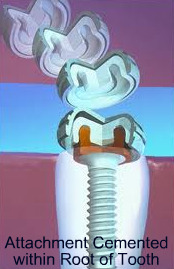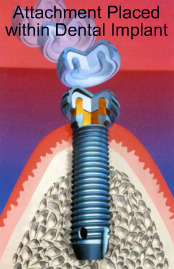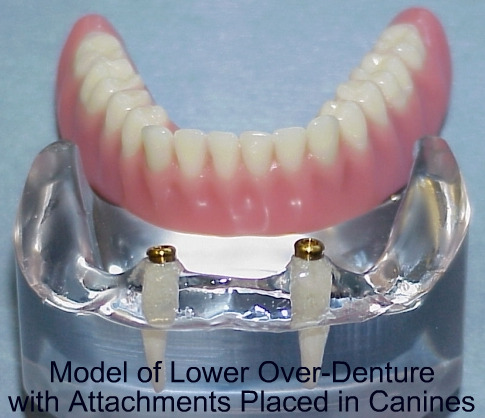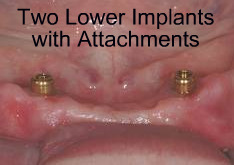Replacing Teeth
Partial Over-Dentures with "Snap-In" Fit
Advantages of a Partial Over-Denture versus Standard Partial Denture:
- Added stability to reduce shifting of Partial
- Added retention to eliminate dislodging chances
during speaking and eating
- Retention strength is adjustable within seconds by dentist replacing nylon inserts in denture
- Eliminates metal clasps for the ultimate in esthetic results
How are attachments placed in the mouth?
- Attachments are anchored in the mouth by either an existing tooth or an implant
- Existing teeth are used most often, however they need to meet the following criteria:
- Be structurally sound enough to support an attachment -> teeth that are no longer strong enough to be utilized in any other way can often still function to support an attachment
- If the tooth has not already had Root Canal Therapy, it would require such treatment to enable the attachment to be placed.
- The tooth is trimmed level with the gums and the attachment is bonded into the tooth
- The denture then rests over the attachment, thus the attachment is NOT visible while the denture is in place.
- When implants are used, the implant(s) is(are) first placed and allowed to heal for several months before the attachment is threaded into the implant and the denture fabricated. Implants are used when there are not healthy enough teeth to place attachments.


Complete Over-Dentures with "Snap-In" Fit
Complete Over-Dentures have significant advantages over Conventional Complete Dentures.
- Exceptional Retention and Stability -> no need for denture adhesive, even for severely resorbed bony ridges
- By keeping several teeth or placing implants for attachments, the bony ridge in these areas will be protected from resorbing (ie. disolving) and thus remain stronger and healthier over time.
How are attachments placed in the mouth?
- Attachments are anchored in the mouth by either an existing tooth or an implant
- Existing teeth are used most often, however they need to meet the following criteria:
- Be structurally sound enough to support an attachment -> teeth that are no longer strong enough to be utilized in any other way can often still function to support an attachment
- If the tooth has not already had Root Canal Therapy, it would require such treatment to enable the attachment to be placed.
- The tooth is trimmed level with the gums and the attachment is bonded into the tooth
- The denture then rests over the attachment, thus the attachment is NOT visible while the denture is in place.
- When implants are used, the implant(s) is(are) first placed and allowed to heal for several months before the attachment is threaded into the implant and the denture fabricated. Implants are used when there are not healthy enough teeth to place attachments.


